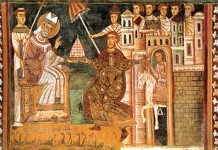You have just heard one of the parables of Jesus, quite a complicated one. It accomplishes what a parable is supposed to do: it teases the imagination. Who was that king, and how could anyone, presumably his subject, dare refuse the invitation to the prince’s wedding, much less abuse the messengers? Why would the invitee even want to, given that retribution was swift and terrible: “He sent troops to destroy those murders and burned their city.”[1] Is it not equally odd that the king would have his slaves fill the hall with whatever riff-raff they could find in the streets of the city, including perhaps beggars and even those prostitutes and tax collectors that Jesus praised for accepting the summons to repentance proclaimed by John the Baptist . . . and which the chief priests and the Pharisees refused:
Truly, I say to you, the tax collectors and the prostitutes go into the kingdom of God before you. For John came to you in the way of righteousness, and you did not believe him, but the tax collectors and the prostitutes did.”[2]
The business about the wedding garment is also confusing. What precisely was it? And how was the poor fellow to obtain one? Why did he not at least try to explain? The king is again relentless in his punishment for what seems to have been a minor faux pas, a trivial social gaffe.
There are numerous other parables in the Gospels as well as similes, comparisons and figures of speech. Even as simple a statement as Jesus’s “I am the good shepherd” has layers of meaning when we remember how central shepherds are in the history of salvation. Abel, killed by his own brother, Cain, was a shepherd, as were the patriarch Jacob—the father of the twelve tribes of Israel—Moses—both a prophet and a priest—, and David—the king who was pleasing to the God. Our Lord’s being the good shepherd thus implicitly identifies him as the progenitor of the new, the true Israel, as its prophet and priest, and also as the new David, a king who reigns from the cross. Some of the parables are simple, like the ones about the lost sheep or the lost coin; others can be quite elaborate, such as the parable of the sower whose seed fell, some on the path, some on rocky ground or among thorns, and some on good soil. Two of the most beautiful are found in Saint Luke’s Gospel: the prodigal son and the good Samaritan. But again, there are obscurities. What is the purpose in the story of the prodigal’s older brother who was so angry that he refused to enter the house? And what was a Samaritan doing far from home, on the road from Jerusalem to Jericho? Those parables are rich in symbolism, and I cannot accept the opinion, fairly common among biblical scholars, that the point of the parable of the good Samaritan, for instance, is simply “Be nice; be kind to strangers.” Our Lord himself seemed to point to a subtle and far from obvious interpretation of his preaching when he explained
to those who were about him with the twelve . . . concerning the parables. And he said to them, to you has been given the secret of the kingdom of God, but for those outside everything is in parables; so that they may indeed see but not perceive, and may indeed hear but not understand; lest they should turn again, and be forgiven.”[3]
Surely, he wanted his auditors to grasp the meaning of his words; we know that because at the beginning of his ministry he made his meaning abundantly clear: “Repent and believe the good news.”[4] What could be more direct? It was the message that John the Baptist had proclaimed with such vigour. “You brood of vipers! Who warned you to flee from the coming wrath? Produce fruit in keeping with repentance.”[5] Why, then, could the people not understand the parables of Jesus? I think the point is this: his proclamation of the kingdom was meant to have an affect on people, to lead them to a change of heart, for that is what repentance means. The casual listener, the mere passer-by could not profit from hearing the message because there was no investment of self in his lukewarm response to the message of salvation. Just as someone who is tone deaf cannot tell jazz from Gregorian chant, so the obtuse listener could not recognize or respond to the call to repentance.
Perhaps after this long preamble, you are expecting me to provide a brilliant exposition of today’s Gospel, about that merciless king. But if, as I say, the purpose of a parable is to intrigue the mind of the hearer as well as to invite him to a profound encounter with its speaker, it would surely be more in keeping with the spirit of the Gospel to leave you with the text that you have just now heard, allowing you to gauge its applicability to you in the here and now. Instead, then, of my expounding on the effect the parable has had on me, let me imitate the method of Jesus’s preaching by teasing your imagination with a parable of my own.
The kingdom of heaven may be compared to a young man who moved from Quebec to Saskatchewan some years ago. Although he spent many years there, his English was never very good; nor did he ever lose his heavy French-Canadian accent. When, as an old man he was close to death, his family looked for a priest who could manage French to administer the last rites. I was called upon, but, to my surprise, when I greeted him in French, I discovered that he could not respond; he had lost his native tongue.
[1] Mtt 22.7.
[2] Mtt 21.31-32.
[3] Mk 4.10-12
[4] Mk 1.15.
[5] Mtt 3.7-8.











